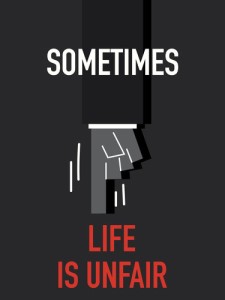Does Genetics Cause Obesity?
Author: Dr. Stephen Chaney
 It’s frustrating. Try as hard as you might, you just can’t seem to lose weight. Even worse you suspect that your friends – and maybe your doctor – assume that you are cheating on your diet. It just doesn’t seem fair.
It’s frustrating. Try as hard as you might, you just can’t seem to lose weight. Even worse you suspect that your friends – and maybe your doctor – assume that you are cheating on your diet. It just doesn’t seem fair.
Perhaps there is a simple explanation. Maybe your genes are keeping you from losing weight. Does genetics determine weight? It has been hypothesized that some of us have a “thrifty” phenotype when it comes to weight loss while others are “spendthrifts”. The theory is that people with a “thrifty” phenotype hold on to weight more tightly when they are “fasting” (i.e. trying to lose weight) and gain weight more readily when they are “feasting” (i.e. eating excess calories).
The metabolism of the “spendthrifts” is exactly the opposite. They lose weight rapidly when fasting and gain weight slowly when feasting. Those would be all of your skinny friends who just can’t seem to understand why you have such difficulty losing weight.
Those experts who favor the “thrifty” phenotype hypothesis point out that it would have provided a tremendous survival advantage in prehistoric times when food was scarce. That’s why some of those same experts think that up to 80% of the population has the “thrifty” phenotype. When you couple the thrifty phenotype with the typical American diet and lifestyle it becomes easy to understand why we have an obesity epidemic in this country.
Is the “thrifty” phenotype hypothesis true? Could it explain why you have such difficulty losing weight? A recent study suggests the answer to those two questions may be yes. I will outline the evidence below.
Then I will address what are probably the two most important questions for you: “If the thrifty phenotype hypothesis is true and you have the thrifty phenotype, are you destined to be overweight? Is there anything you can do about it?
How The Study Was Designed
 This study (Reinhardt et al, Diabetes, 64: 2859-2867, 2015) was truly a remarkable study. 15 healthy, but obese volunteers were put in a metabolic ward for a total of 11 weeks. In the metabolic ward every aspect of their metabolism was closely controlled and measured.
This study (Reinhardt et al, Diabetes, 64: 2859-2867, 2015) was truly a remarkable study. 15 healthy, but obese volunteers were put in a metabolic ward for a total of 11 weeks. In the metabolic ward every aspect of their metabolism was closely controlled and measured.
- They were given diets that were precisely calibrated to provide a predetermined caloric (energy) input.
- Urine and feces were collected and analyzed in an instrument called a bomb calorimeter to determine calorie (energy) output.
- They were limited to primarily sedentary activity for the duration of the experiments, and the temperature of the metabolic ward was maintained constant. This eliminated variation in energy expenditures due to activity and temperature.
- Metabolic energy expenditure was calculated by placing them in a special room designed to precisely measure oxygen consumption and CO2 production by the subjects over a 24 hour period. Don’t worry about the details. Just know that this is the gold standard for measuring energy expenditure.
Here is what the subject’s 11 weeks in the metabolic ward looked like:
- During the first 3 weeks the subjects were provided with a diet designed with just enough calories to maintain their weight based on their weight and sex. If weight gain or loss was observed the calories were adjusted accordingly.
- During one 24 hour period in week 3 the subjects were place on a diet that decreased their calories by 50%, (defined as “fasting” in this study) and the resulting decrease in metabolic energy expenditure was measured as described above.
- During another 24 hour period in week 3 the subjects were place on a diet that increased their calories by 200% (defined as “overfeeding” in this study), and the resulting increase in metabolic energy expenditure was measured.
- During the next 6 weeks the subjects were placed on calorie restricted diet that only provided 50% of the calories they needed to lose weight.
- During the final 2 weeks the subjects were placed on a diet designed to provide the calories needed to maintain their new weight, whatever it was.
How Does Genetics Determine Weight?
 The results of the study were quite interesting:
The results of the study were quite interesting:
- All of the subjects lost weight, but the amount of weight loss ranged from 5% to 12% of the original body weight.
- Their starting weight did not influence their rate of weight loss during calorie restriction, but their metabolic response to fasting and overfeeding significantly affected their rate of weight loss. Specifically:
- The subjects with the smallest decrease in energy expenditure during fasting and the largest increase in energy expenditure during overfeeding (the spendthrifts) lost significantly more weight during the 6 week caloric restriction period (what most of us call a diet).
- The subjects with the largest decrease in energy expenditure during fasting and the smallest increase in energy expenditure during overfeeding (the thrifty) lost significantly less weight during the 6 week caloric restriction period.
- The amount of caloric restriction needed to lose one pound of weight ranged from 1,558-2,993 depending on whether the subjects displayed the spendthrift or thrifty phenotype. That’s almost a 2-fold difference.
What Does This Study Mean For You?
 Life isn’t fair. You probably already suspected that. Your skinny friends actually do have a much easier time losing weight than you do. In fact, they may be able to lose up to twice the amount of weight with exactly the same amount of caloric restriction.
Life isn’t fair. You probably already suspected that. Your skinny friends actually do have a much easier time losing weight than you do. In fact, they may be able to lose up to twice the amount of weight with exactly the same amount of caloric restriction.
However, the good news is that weight loss is possible – even for you. Everyone in the study lost weight – even those subjects with the thriftiest phenotype. So the question becomes what can you do to lose weight successfully? Here are 5 simple tips.
#1: Don’t give up. Stick with it. Pounds may come off slowly for you, but this study shows they will come off. You just have to keep the faith and be consistent.
#2: Watch what you eat very carefully. The researchers in this study controlled every morsel of food the subjects ate. People always lose weight more rapidly when they are in a metabolic ward. My recommendation is to track what you eat daily using one of the many available tracking apps.
#3: Be consistent with your exercise. The subjects in this study were not allowed to exercise, but that is one of the best ways to increase energy expenditure. Aerobic exercise gives you a small increase in energy expenditure during and immediately following the exercise. Weight bearing exercise gives a long term increase in energy expenditure because it increases muscle mass, and muscle burns calories faster than any other tissue.
#4: Choose a diet that preserves muscle mass (High Protein Diets and Weight Loss ) while you are losing weight.
#5: Avoid all those diets with herbal and pharmaceutical stimulants. They are dangerous and they may just kill you. Check out Are Dietary Supplements Safe.
The Bottom Line
A recent study (Reinhardt et al, Diabetes, 64: 2859-2867, 2015) did a very careful metabolic analysis and divided subjects into what they characterized as either a “thrifty” or “spendthrift” phenotype based on their changes in metabolic energy expenditure in response to fasting and overfeeding. They then looked at how those phenotypes affected weight loss during a 6 week period of caloric restriction. Does genetics cause obesity or help determine weight? Here’s what they found:
- All of the subjects lost weight, but the amount of weight loss ranged from 5% to 12% of the original body weight.
- Their starting weight did not influence their rate of weight loss during caloric restriction, but their metabolic response to fasting and overfeeding significantly affected their rate of weight loss. Specifically:
- The subjects with the smallest decrease in energy expenditure during fasting and the largest increase in energy expenditure during overfeeding (the spendthrifts) lost significantly more weight during the 6 week caloric restriction period (what most of us call a diet).
- The subjects with the largest decrease in energy expenditure during fasting and the smallest increase in energy expenditure during overfeeding (the thrifty) lost significantly less weight during the 6 week caloric restriction period.
- If you struggle to lose weight, this is a good news – bad news study.
- The bad news is that life isn’t fair. You probably already suspected that. Your skinny friends actually do have a much easier time losing weight than you do.
- The good news is that weight loss is possible – even for you. Everyone in the study lost weight – even those subjects with the thriftiest phenotype. So the question becomes what can you do to lose weight successfully? I’ve given you 5 simple tips in the article above.
These statements have not been evaluated by the Food and Drug Administration. This information is not intended to diagnose, treat, cure or prevent any disease.
